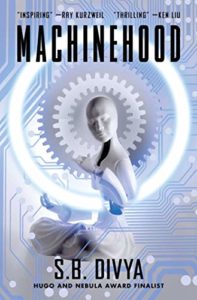Synopsis: Religious fanatics assassinate a billionaire, gig-work is stressful, and then someone goes to space.
Book Review: You know how sometimes grandpa starts out telling you a story which sounds like it’s going to have a lot of promise, but it just kinda wanders and rambles and never gets to any point, and eventually you start to suspect that the speaker doesn’t remember what they were originally on about? This book is the novelization of that. It starts out good. The nuts-and-bolts writing itself is good, Divya knows how to make good sentences and paragraphs and all that. But nothing happens.
I’m gonna drop a few spoilers here, which I normally avoid, but they are things I would have wanted to know before starting the novel, so I think they’re justified.
The novel is deceptively marketted, IMO. I was promised a “science fiction thriller about artificial intelligence, sentience, and labor rights in a near future dominated by the gig economy.” I kept expecting there to be some sort of conflict between humans and artificial intelligence(s), and maybe something about what personhood means, and what rights it conveys. Afterall, “machinehood” is a direct reference to “personhood.” Maybe something like the core conflict of The Measure of a Man.
There is nothing like that here. There are no sentient AIs in this novel. Instead, there are humans who modify themselves with drugs, nanotechnology, and cybernetics. A group of religious fanatics decides that capitalism sucks, so they kill a billionaire and pretend they are a newly born Sentient AI that is about to take over the world. Our hero takes their head priest hostage, so the govt decides not to blow up their compound. That’s about it. There isn’t ever any consideration of what it means to be a person, or if artificial intelligence would count. No exploration of how such a debate would effect the world, or shape life, or effect the general public, or world politics.
I mean, the writing itself is fine! And there’s some cool things in the novel. The portrayal of a majority gig-work economy was cool. The extrapolation of protests-as-theater turning into literal performance art, with hired protestors and supermodel bodyguards, that get permits and register their riots and violence beforehand, was both surrealisticly humorous and plausibly prophetic. The way humanity is shown to accept new tech and adopt it to make their lives better and more efficient is great! But I need more than cool world-building ideas, especially in a book that’s sold as a philosophical exploration and/or thriller.
Speaking of this being a thriller — I really loved the bad-ass main character, a disillusioned special forces soldier. The novel could’ve been decent action beach reading… if not for the fact that half of it follows the soldier’s sister-in-law for no reason. Her problems are boring, they resolve themselves without struggle or fuss within a few pages, and she literally contributes nothing to the plot. And I really do mean that literally. Every single chapter focusing on her could be removed, and the plot of the book would be entirely unchanged. This is so blatent that I honestly believe this book was originally written purely from the soldier’s perspective. The publisher looked at pretty decent novella, said to Divya “This is about half the page-count we need. Double it if you want to be published,” and Divya inserted a bunch of filler fluff that doesn’t matter. Her lack of interest in the sister-in-law’s story shows. And, critically, whenever things start to get exciting with the soldier (her partner is critically wounded in an attack, and the world’s communication satalites are falling out of the sky!) we cut back to her sister-in-law and get a chapter that completely defuses all tension by boring us with pages of her emailing her boss about getting access to corporate research data that she thinks she’s being unfairly denied access to. Yes, really.
I feel kinda upset for the author here, because I think this could’ve been a good novella that was ruined by publisher demands. Unfortunately, Not Recommended.
Book Club Review: We actually had a bit of a good time figuring out what went wrong. Every one of us came into this with a feeling of “this novel looks good on paper, and no individual part of it is bad at any point, but it’s really unsatisfying and I don’t know why!” It took a bit of talking and hashing things out before we finally landed on the realization that nothing of consequence happened, and we had been promised many things of great consequence would happen. The ‘there is no AI anywhere in a book with this marketting, cover, and title is super lame’ answer coallesed out of teamwork, and it felt pretty fun to have solved the puzzle together. That being said, Not Recommended.

